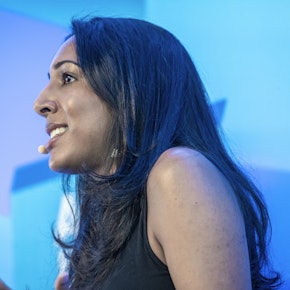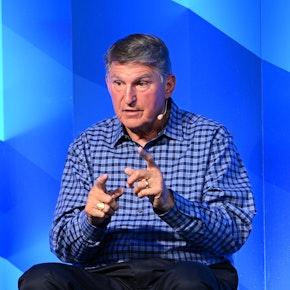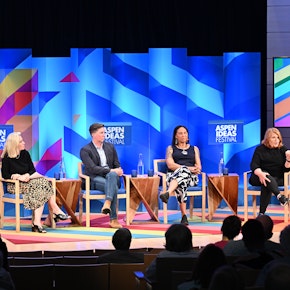USA
Politics

Americans feel more polarized than ever, but two governors from opposite sides of the aisle have made it their mission to show otherwise.

Former Senators Bill Nelson and Kay Bailey Hutchison discuss the bipartisan work that defined their careers, suggest ways for today’s elected officials to find common ground, and tell how the two of them helped launch NASA into a new era of exploration.

Firearms are one of the leading causes of death among children in the U.S., a country where there have been more than 150 mass shootings in the first five months of 2024. Sit with those statistics for a moment — then ask what roles policy, litigation, art and public awareness can play in solving one of America’s most intractable problems.

Join our panel of expert analysts for a pre-debate conversation about how the 2024 election is shaping up. Stay for the debate watch party and refreshments, then hear the panel weigh in on the debate performances and what we should watch for as we head into the national party conventions.

Governor Gretchen Whitmer has a reputation for getting things done, even as she leads a purple state that’s a battleground for many of our nation’s most hotly contested issues. Katie Couric talks with the Michigan governor about life, leadership and the lessons she has learned along the way. Governor Whitmer's new book, True Gretch, will be available for sale following th...

Polls show that many voters feel the Democratic Party is disconnected from the concerns of ordinary voters. Is it in danger of becoming the party of college-educated elites?

President Biden promised to push for bipartisan legislation, and the White House Office of Management and Budget’s director has been key to the process. With a reputation as a skilled negotiator and a willingness to work across the aisle, OMB Director Young has navigated the threat of government shutdowns and a debt-ceiling crisis. What’s the secret to her success?

The January 6 attack on the U.S. Capitol was, for many, proof of our nation’s hopeless polarization and the danger of unchecked radicalization. But who were these people who stampeded through the halls of Congress, and what motivated them? How can we build understanding so that we can disrupt extremism before it takes hold?

The engaged citizen is democracy’s greatest asset, but many Americans are disillusioned and disengaged, and feel a loss of agency. In this focus group conversation, next-generation volunteers, givers, leaders — and audience members — share what motivates and what gets in the way.

Americans are expected to be active political citizens and leave their opinions at the workplace door. Renewed efforts to expand participation, representation and shared decision-making at work — think employee ownership, labor unions and an expanded set of economic rights — may offer a framework to rebuild faith in democracy.

The U.S. is spending record amounts on infrastructure, with billions of federal dollars going to bridges, clean drinking water, broadband, and climate and energy. The governor of Maryland talks about what that looks like at state and local levels — and why it’s necessary now.

U.S. Senator Joe Manchin announced last month that he would change his party affiliation from Democrat to Independent, leaving many to wonder about his future plans in a divisive election year. Join the senator alongside his daughter, Heather Manchin, as they discuss their new organization, Americans Together, and how they hope to give politically homeless centrists a voic...

America’s southern border is a flashpoint for contentious political and cultural disagreements, as well as the site of a growing humanitarian crisis that existing laws, policies and institutions seem incapable of addressing. Are there any real solutions in sight?

What if the threat to American democracy came from within our own military? “War Game,” a 2024 Sundance Official Selection documentary, imagined just such a scenario and convened a bipartisan group of policymakers to respond. What did they learn — and how real is the threat?

We the people were not truly “We the People” until the Reconstruction amendments altered our Constitution in a post-Civil War "second founding". As we confront another democratic crisis, what new understandings could ensure our democratic renewal?

John Fetterman was campaigning for the US Senate when he suffered a near-fatal stroke. Fortunate that a visiting physician was on duty in a nearby rural hospital, Fetterman survived and went on to win the general election. A few weeks after being sworn in, his longstanding struggle with depression intensified and he entered an inpatient mental health facility. He has trans...

Description coming soon.

Laura Kelly sits down to discuss health policy and practice in the state of Kansas. Kelly, a Democrat, heads the traditionally red state of Kansas, where government is divided. She'll discuss challenges—from fiscal pressures, Medicaid cost-sharing, and the need to bolster public health, to the threat of future pandemics and delicate decisions about reproductive health and...

What health issues will play a role at the ballot box this election season? And will they influence voter turnout? As 2024 campaigns heat up, pollsters want to know what most concerns voters and whether those concerns will translate into political engagement, especially in battleground states. They’ll be polling key voting groups, including women, about their priorities an...

How do we describe the Republican Party today, and what are the dynamics that will shape its future?

